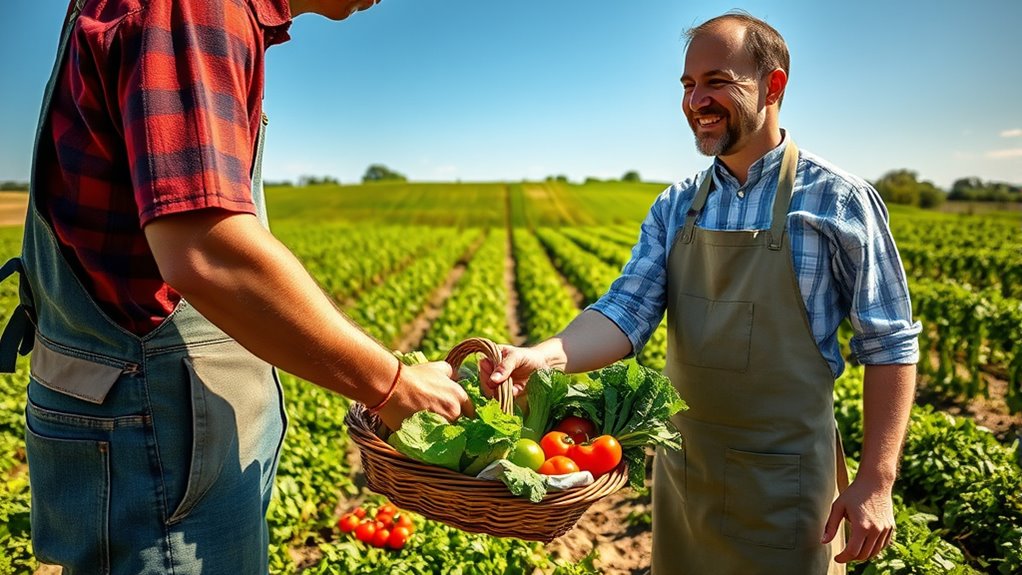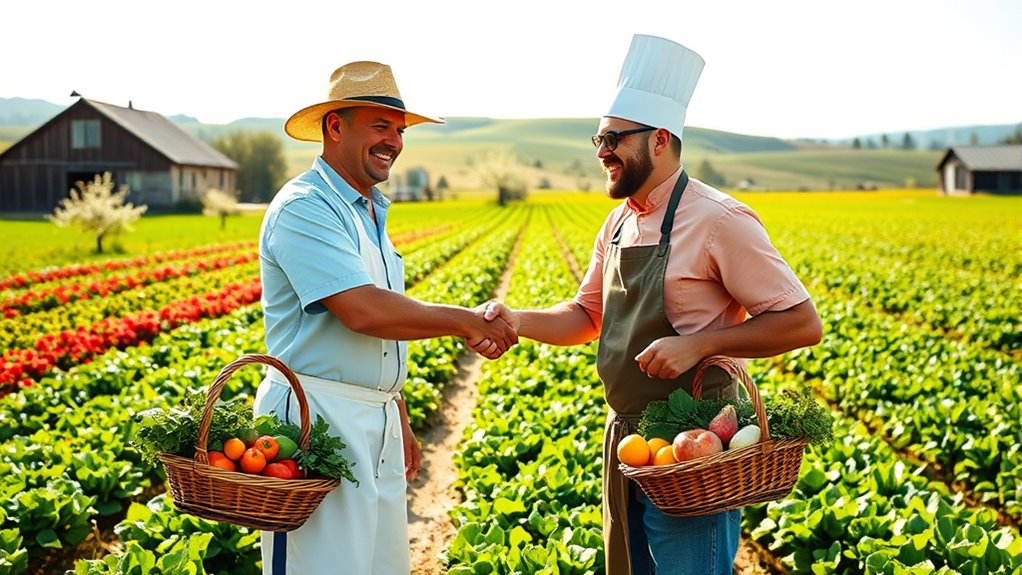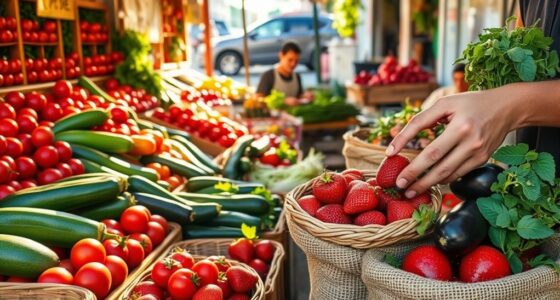Building partnerships with local farms helps you secure a fresh, sustainable, and high-quality food supply that benefits your business and community. By working directly with farmers, you promote transparency, support local economies, and reduce waste through seasonal ingredients at peak ripeness. Good communication and trust are key to building these long-term, reliable relationships. If you keep exploring, you’ll discover more ways to strengthen these partnerships and enhance your food operation’s sustainability.
Key Takeaways
- Establish clear communication, trust, and regular farm visits to understand practices and ensure quality standards.
- Highlight mutual benefits like fresh, seasonal ingredients and supporting local community and economy.
- Negotiate reliable delivery schedules and sustainable practices to foster long-term, consistent partnerships.
- Promote transparency and open dialogue to align goals, enhance collaboration, and build loyalty.
- Emphasize sustainability and farm-to-table principles to differentiate your business and strengthen community relationships.

Building partnerships with local farms is essential for creating a sustainable and fresh supply chain that benefits both your business and the community. When you collaborate directly with nearby farmers, you open the door to a farm to table approach that emphasizes quality, freshness, and transparency. This strategy not only guarantees that your customers receive the best seasonal produce but also supports sustainable agriculture practices that prioritize environmental health and resource conservation. By establishing these relationships, you demonstrate your commitment to sourcing responsibly and reducing the carbon footprint associated with long-distance food transportation. Additionally, fostering local farm relationships can lead to more innovative collaborations and shared knowledge about sustainable practices.
Partnering with local farms allows you to access produce at its peak ripeness, which enhances the flavor and nutritional value of your menu. Fresh, in-season ingredients tend to last longer and require less preservation, ultimately reducing waste. Furthermore, working closely with farmers gives you insight into their growing methods, enabling you to select those who employ sustainable agriculture techniques such as crop rotation, organic farming, and water conservation. These practices not only protect the land but also produce healthier, more flavorful food for your customers. When you prioritize sustainable agriculture, you’re actively contributing to the health of the environment and promoting resilient local food systems.
Building these relationships requires clear communication and mutual trust. You should visit farms, understand their operations, and discuss your needs and expectations openly. This transparency helps ensure that both parties are aligned on quality standards, delivery schedules, and sustainable practices. Establishing consistent, reliable partnerships fosters loyalty and allows you to negotiate better prices, which can translate into more competitive pricing for your customers. Additionally, by supporting local farms, you’re investing in the community’s economy, creating jobs, and strengthening local food security.
Integrating local farm partnerships into your sourcing strategy also enhances your brand’s reputation. Customers increasingly value businesses that prioritize sustainability and ethical sourcing. Sharing stories about your farm partners and the sustainable practices they employ can resonate with your audience, boosting loyalty and attracting new patrons who want to support responsible businesses. In the long run, these partnerships can evolve into collaborative ventures such as farm visits, special events, or co-branded campaigns, further deepening your community ties.
Ultimately, building partnerships with local farms empowers you to create a more sustainable, resilient, and authentic food operation. It aligns your business with the principles of farm to table dining, fosters sustainable agriculture, and helps you stand out in a competitive marketplace. By investing in these local relationships, you’re making a positive impact not just on your menu but on the environment and the community as a whole.
Frequently Asked Questions
How Do I Choose the Right Local Farm Partner?
To choose the right local farm partner, start by checking their farm certification to guarantee they meet safety and quality standards. Look into their crop rotation practices, which reflect sustainable farming methods and soil health. Visit the farm if possible, ask about their practices, and discuss your needs. Trust your instincts and prioritize transparency, reliability, and shared values to build a strong, lasting partnership.
What Are Common Challenges in Farm Partnerships?
Think of farm partnerships as a delicate dance, where missteps happen. Common challenges include aligning sustainable practices like crop rotation, which may differ between partners. Sometimes, unexpected weather or market shifts throw off plans, making collaboration harder. You might face issues with communication or differing goals, but by openly discussing these concerns and focusing on shared values, you can turn obstacles into opportunities for a stronger, more resilient partnership.
How Can Partnerships Benefit Both Parties Financially?
Partnerships can boost your finances through market expansion and revenue diversification. By working with local farms, you access new customer bases and fresh products, increasing sales. This collaboration also spreads risks and reduces costs. You’ll gain a competitive edge, attract diverse clientele, and create stable income streams. Ultimately, these partnerships help both parties grow financially, fostering long-term success and resilience in your business.
What Legal Agreements Are Needed for Farm Collaborations?
You need legal contracts and liability agreements to formalize farm collaborations. These documents define each party’s roles, responsibilities, and payment terms, ensuring clarity and protection. Liability agreements specify who’s responsible for damages or injuries, reducing legal risks. By drafting clear legal contracts, you safeguard your interests and create a solid foundation for working with local farms, making sure everyone’s expectations are aligned and protected throughout the partnership.
How Do I Maintain Long-Term Farm Relationships?
To sustain long-term farm relationships, you should prioritize open communication and mutual respect. Regularly visit the farm, discuss crop rotation plans, and share insights on pest management strategies. Show genuine interest in their success, offer support during challenging times, and be adaptable to their needs. Building trust through consistent collaboration helps foster strong, lasting partnerships that benefit both parties and ensure sustainable farming practices.
Conclusion
By partnering with local farms, you not only support your community but also bring fresh, sustainable products to your customers. These collaborations can strengthen your business and foster a healthier environment. Are you ready to grow together and make a lasting impact? Embracing local farms creates a win-win situation—so why not start building those valuable relationships today? Your community and your business will thank you for it.









